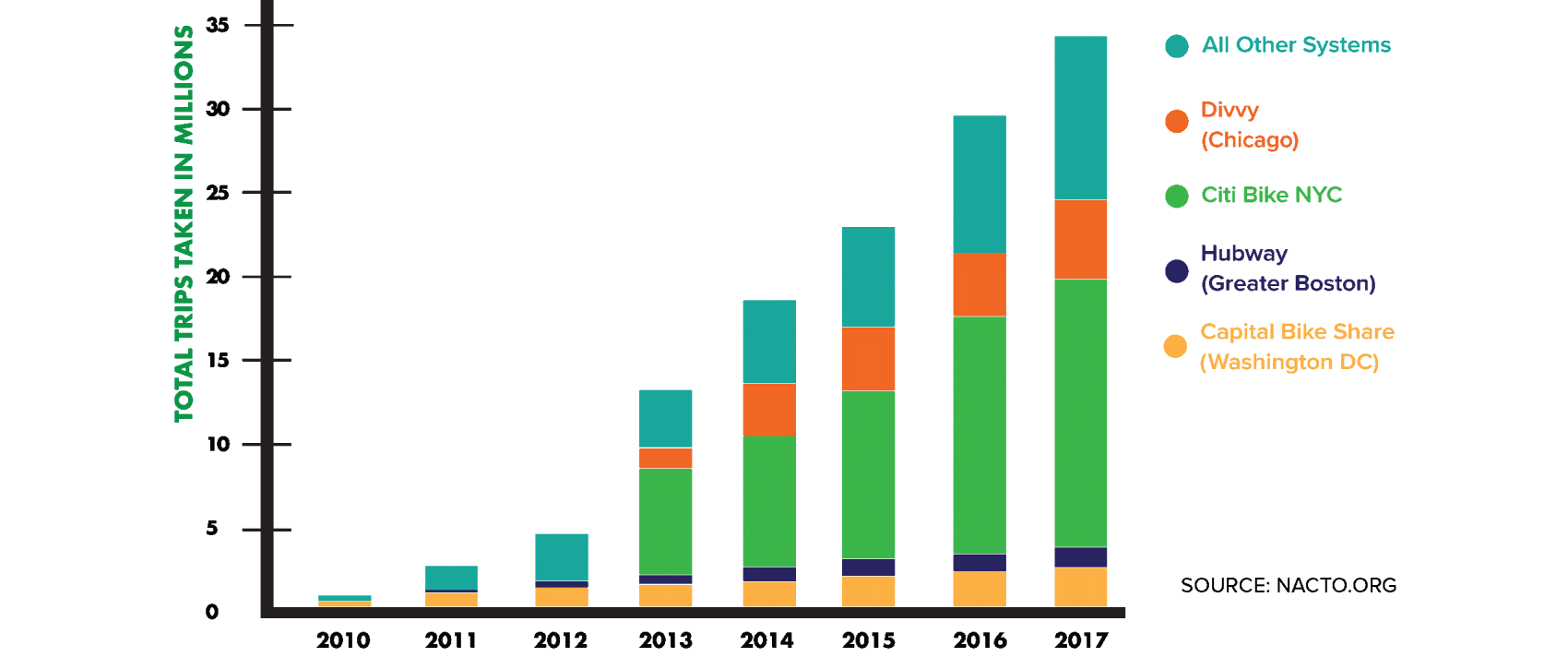
Executive Summary – What’s Happening In The Bike Share World?
On a global scale, the bike sharing world keeps evolving at a rapid pace. Old actors disappear from the scene, new ones pop up, and giants from other sectors start looking with interest at the evolution of shared bicycle mobility, in a swirl of news, names, projects that is difficult to keep up with. This Executive Summary will create order out of the chaos, for our valued readers.
Despite all the hurdles bike sharing is facing globally - and that newspaper always duly report - it continues to be an extremely powerful and successful tool. These schemes have a proven impact on the modal share of bicycle use.
In China, dockless bicycles are taking the country by storm. 16 million shared bikes are reportedly in circulation nationally, with users praising the dockless bike’s ease and low cost to get around on. Similarly in Europe, free-floating bike sharing schemes are becoming an ever growing permanent feature of the city landscape, the most recent considerable additions being in Berlin, Zurich and Toulouse. New technology too is flourishing in the sector, such as the launch of the first ever free floating and self-charging e-bike sharing system, by the smart mobility company Zehus, which hit the streets of Milan earlier this year. Meanwhile in America, even Uber is joining the action. The taxi firm giant just bought Jump Bikes after piloting a scheme of dockless e-bikes in hilly San Francisco.
Operations, operations, operations
This growth and development has not come without its share of teething problems. And if we can identify an overarching theme connecting all these frictions, it's certainly the way some of these companies manage operations. Starting from the high rates of theft and vandalism affecting communal bike fleets around the world. Chinese bike sharing firms have been struggling to address the mass dumping of their discarded and damaged bikes, which are leaving behind vast bicycle graveyards in cities such as Beijing and Shanghai, and has led to the closure of more than 20 out of 77 bike-sharing startups in the country. European schemes have been withdrawing from cities for similar reasons, such as Gobee.bike, who have suspended their operations across the whole continent, citing the relentless destruction of their bikes.
 Another obvious case is the so-called Velibgate, seriously hindering operations in Paris among technical and political issues. Ironically, all the inconveniencies arisen also have an interesting and positive aspect: they have shown, once and for all, the huge impact bike sharing can have on mobility. Or the cyber attack Bycyklen has suffered in Copenhagen: all its smart bikes were hacked. This caused not only an embarassing email to be sent to all users, but an operation disruption as well, since the only way to make the e-bikes usable again was to reboot all of the 1850 of them individually. In any case, bike sharing is hardly the only service causing so-called "graveyards" of vehicles - but certainly is the most mediatised: this on the right is just one of US' huge parking lots destined to Volkswagen cars that have been discarded because of the dieselgate.
Another obvious case is the so-called Velibgate, seriously hindering operations in Paris among technical and political issues. Ironically, all the inconveniencies arisen also have an interesting and positive aspect: they have shown, once and for all, the huge impact bike sharing can have on mobility. Or the cyber attack Bycyklen has suffered in Copenhagen: all its smart bikes were hacked. This caused not only an embarassing email to be sent to all users, but an operation disruption as well, since the only way to make the e-bikes usable again was to reboot all of the 1850 of them individually. In any case, bike sharing is hardly the only service causing so-called "graveyards" of vehicles - but certainly is the most mediatised: this on the right is just one of US' huge parking lots destined to Volkswagen cars that have been discarded because of the dieselgate.
A bright future is coming
And the positive data and impact of bike sharing is clear. A year after taking its distinctive orange bikes to Singapore, Mobike reported that the modal share of cycling in the region doubled. The environmental impact of this shift is not insignificant, as it reduced the consumption of 300,000 litres of gasoline, which prevented the release of 700 tons of co2 emissions into the atmosphere. This promising trend has also been documented in America. 35 million bike sharing trips were taken in 2017, which the graph demonstrates, is a 25% increase from the previous year.

These successful bike sharing schemes in the States have not only increased the number of people cycling, but they have also enabled a wider breadth of society to participate. Programs that offer income based discount for communal bike hire, such as the Better Bike Share Partnership in Philadelphia, have sought to make cycling more accessible to lower income communities, with great success. A second way in which bike sharing has proven to be a power for good, is its potential to boost local economies. Data released from the financial service company MasterCard found that businesses nearby a bike sharing dock, in both Brooklyn and Jersey City, reported an increase in sales growth a year after the scheme was installed in the area.
A good Policy Framework is key
 The key to bike scheme success appears to depend on how cities regulate and frame their services. The Singapore Ministry of Transport is tightening its regulation of shared bicycle schemes. Operators in the city-state are now obliged to hold a license, and ban users who continually refuse to park in designated spaces. The number of bicycles they can deploy has also been restricted. Those who do not comply face a heavy fine or risk having their license revoked.
The key to bike scheme success appears to depend on how cities regulate and frame their services. The Singapore Ministry of Transport is tightening its regulation of shared bicycle schemes. Operators in the city-state are now obliged to hold a license, and ban users who continually refuse to park in designated spaces. The number of bicycles they can deploy has also been restricted. Those who do not comply face a heavy fine or risk having their license revoked.
An alternative approach is being trialed in Bologna, where for the first time a dockless bike sharing scheme is being funded by a public body. The Italian city’s municipality declared bike sharing to be a public service, and launched a six year project that will deploy 2,500 shared bikes onto its streets, under the management of Mobike. These cases suggest that the success of our bike sharing schemes is in the hands of municipal governments. It is a question of political will.
Regions:
News category:
Network/Project Involved:
Contact the author
Recent news!
Upcoming events
Contact Us
Avenue des Arts, 7-8
Postal address: Rue de la Charité, 22
1210 Brussels, Belgium









